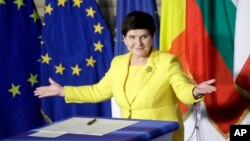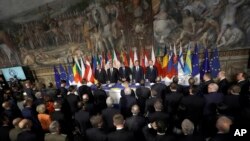The European Union celebrated 60 years since its creation with the signing of a new treaty in Rome Saturday, four days ahead of the start of Britain's formal exit from the bloc.
Twenty-seven countries met to sign a new declaration on Capitoline Hill - where six founding states signed the Treaty of Rome, creating the European Economic Community, in 1957.
"Prove today that you are the leaders of Europe, that you can care for this great legacy we inherited from the heroes of European integration 60 years ago," EU President Donald Tusk said.
Though EU leaders renewed their commitments to the bloc looking forward and declared that "Europe is our common future", the question of Europe's future without Britain was one of the many looming concerns.
Britain absent
British Prime Minister Theresa May was absent from the talks held Saturday, and anti-Brexit demonstrators were among the tens of thousands protesting, both for and against Europe, outside of the meetings in Rome.
Inside the meeting, a point of contention in the Rome Declaration was the introduction of and commitment to a "multi-speed" Europe, which would allow countries to adopt certain policies on different timelines.
"We will act together, at different paces and intensity where necessary, while moving in the same direction," the addition to EU policy reads in the treaty - a concept which has faced opposition from a number of Eastern European states that was introduced by France and Germany.
Polish Prime Minister Beata Szydlo, who only recently confronted other leaders over the appointment of her predecessor, Tusk's appointment as EU president, only agreed to sign the treaty in the last minutes of the meeting, citing his opposition to the multi-speed addition.
Greece also held up approval of the document while pushing for a mention of social benefits.
Security in Rome and particularly in Palazzo dei Conservatori, where the meeting took place, was particularly tight in the wake of attacks in London earlier this week.






